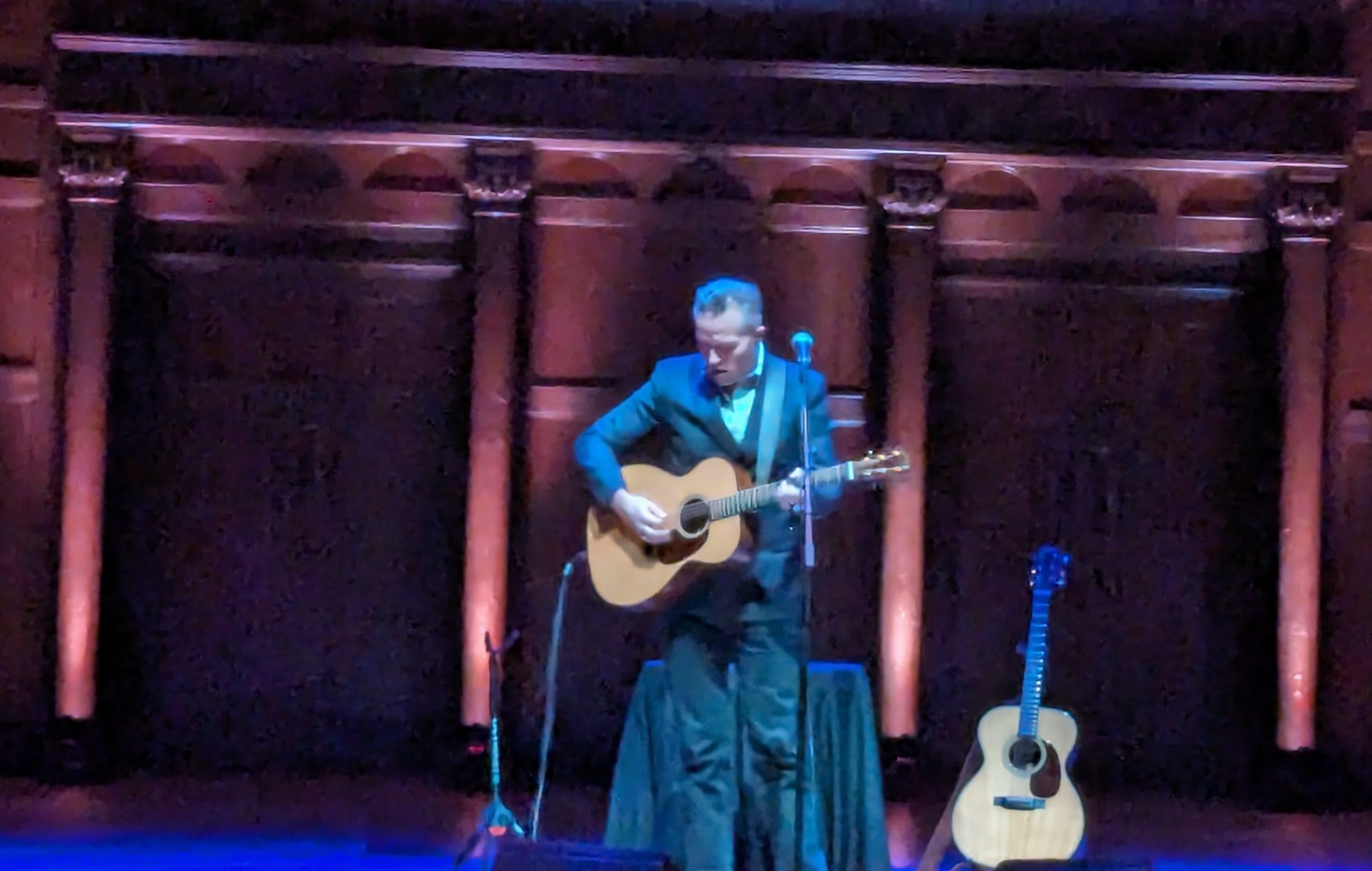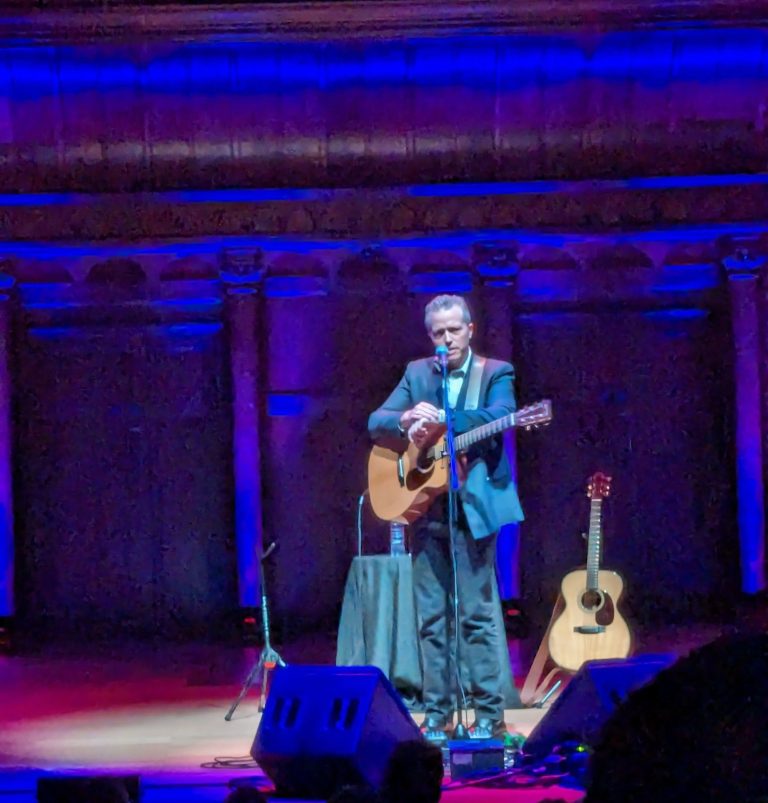Introducing his song “If We Were Vampires” – a love song both enhanced and weighted down by the spectre of mortality – Jason Isbell admits that what he considers beautiful is probably a lot “sadder” than it is for most people. Such has always been an enduring quality in Jason Isbell’s songwriting, even as his career and personal life have moved at breakneck speed over the last two decades – from his days as a Drive-By Trucker in his early-20s, a stint in rehab and ensuing sobriety, his marriage to – and fruitful musical collaborations with – Amanda Shires, his solo breakout with 2013’s Southeastern, and a series of increasingly ambitious projects with his band The 400 unit. Of course, that doesn’t even cover his recent acting debut in Scorsese’s Killers of the Flower Moon.
His solo acoustic set at London’s Cadogan Hall encompasses the entirety of Isbell’s impressive career – from the desolate Drive-By Truckers number “Goddamn Lonely Love” to harrowing stadium rockers from last year’s Weathervanes, like “King of Oklahoma”. The solo nature of these performances – just Isbell and his acoustic guitar – heightens the mournful sense of isolation at the heart of so many of these songs. Whereas one might have been able to hide from the sorrow of the addiction-centred “King of Oklahoma” in the full band sound of the studio version, there’s no hiding from a crushing admission like “Nothing makes me feel like much of nothing anymore” in such a stripped down setting.

Isbell begins his set with “If You Insist” – a desperate, even claustrophobic, plea for connection that alternates between existential questioning and bargaining. The following “24 Frames” is another cut that ripples with tension, fit with one of Isbell’s most iconic and anxiety-inducing lines (“You thought God was an architect, now you know / He’s something like a pipe bomb ready to blow”).
The apocalyptic sensibility of “24 Frames” is an exception rather than the rule – both in terms of tonight’s set and Isbell’s discography at large. Isbell seems less inclined to write of destructive ends – of everything going up in flames – than he is to write about what happens when you pull yourself back from the brink. In many ways, it’s harder to do the latter – to face up to both your darkest demons and biggest hopes without the numbing powers of substances. It’s Isbell’s unflinching honesty in writing these such songs that makes him a generational talent.
“Different Days”, which immediately follows “24 Frames” tonight, is one such song – a reflection on a lifetime of memories and shifting perspectives as time goes on. “And the story’s only mine to live and die with…”, sings Isbell, “…And the answer’s only mine to come across”. It’s one of his most haunting lines, but also most resolute too – those around us can provide clarity, inspiration, temptation and deeper meaning, but only we as individuals can dig ourselves out of whatever constraints we may be ensnared in.
Isbell’s set in London is billed not as part of the tour in support of Weathervanes but as a celebration of the 10th anniversary of his solo breakthrough Southeastern – which was recently reissued and remastered as a four-disc box set. It’s fitting then, that so many of the song’s Isbell has picked for his 15-song set grapple with the past and the arrow of time at large. On “Live Oak”, the Southeastern deep cut that deals most acutely with pre and post deciding to quit drinking, he wonders whether people confuse the old and new versions of himself. However, beyond the hopes of a clean slate, lies the realisation that we can’t escape our past (“There’s a man who walks beside me; he is who I used to be”) and instead have to find a way to make peace with all versions of ourselves.
“Cover Me Up”, Isbell’s most recognisable hit by some distance, closes out his pre-encore set, and solidifies Southeastern’s timeless status. A recently flu-stricken Isbell has to start the song anew after attempting the song’s chorus in too high a tuning the first time round – a poetic happenstance for a song that celebrates the grace of second chances. This soaring love song, about using your love of another as inspiration to tackle your demons, is one of Isbell’s most conventionally uplifting. But it’s also one of his most vulnerable too – yes, it’s hard to face up to the ugliest, most hurtful parts of your past, but it’s harder still to admit to needing someone else.
In whiplash-inducing fashion, Isbell follows up the edifying “Cover Me Up” with a two-song encore that concludes with the harrowing “Cast Iron Skillet” – which alternates between old Southern wisdoms and vignettes of tragedy (murder and estrangement chief among them). Isbell often likes to leave his songs on a note of unresolve, and “Cast Iron Skillet” is no exception – fit with repetitions of “How did he get so low?” It’s yet another Isbell song that explores the road less travelled – instead of finding comfort in old Southern traditions, he exposes their dark underbelly that’s often glossed over by romanticised nostalgia. It’s unnerving but unmistakably powerful – true to the famous James Garfield quote that has long befitted Isbell’s music, “the truth will set you free, but first it will make you miserable”.

